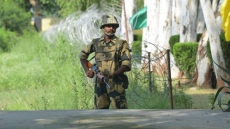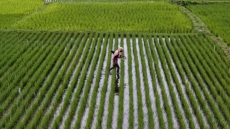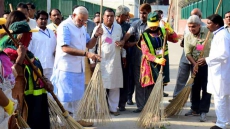Two more civilians were injured in overnight mortar shelling by Pakistan Rangers along the International Border in Jammu district, police said here Sunday.
"Two civilians were injured in Jabowal village of Arnia sub-sector in Pakistani shelling during the night. The injured civilians were shifted to a hospital for treatment," a police officer said.
Pakistan Rangers started mortar shelling and automatic weapons firing around 9 p.m. Saturday in R.S. Pura sector.
The Border Security Force "effectively retaliated" Pakistan's violation of the 2003 bilateral ceasefire agreement, said the officer.
"Firing exchanges continued throughout the night and are still going on in the area intermittently," the officer added.
Eight civilians have been killed in unprecedented peace time mortar shelling by Pakistan on the International Border and the Line of Control (LoC) in the Jammu region since Oct 6, while 62, including 57 civilians, have been injured.
As many as 30,000 border residents are presently living in relief camps set up by the state government away from the areas vulnerable to Pakistani shelling.
Pakistani shelling makes life hell for border people
Life for nearly 30,000 people living in relief camps has been turned upside down after they were forced to abandon their homes because of indiscriminate shelling from across the India-Pakistan boder on civilian habitations in Jammu, Kathua and Samba districts. Local residents say the hostilities were nothing short of a war, save for the movement of tanks and fighter planes.

Eight civilians have been killed and more than 60 injured in Pakistani mortar shelling since October 6 on the Line of Control (LoC) and the International Border (IB) in Jammu and Kashmir. Just five among the injured are security personnel - four army soldiers and a paramilitary BSF trooper.
The Pakistani army and paramilitary Rangers have violated the ceasefire agreement 35 times in five days, Indian military offiicals say. The Indian Army and the BSF have been adequately retaliating, but the matching retaliation to this act of aggression has not brought any succour to the lives of the traumatized villagers on the border.
"The present shelling by Pakistan has been worse than the 1971 war in the R.S. Pura sector. We have left everything behind and have been living in this ITI building since then," a visibly angry resident at the R.S. Pura relief camp, who did not want to be named, told IANS.
"The new government at the centre had promised there would be peace on the border after it took over. We voted for the BJP during the Lok Sabha elections because of that promise. See what has happened to us now," he added.
There are over 30 relief camps set up for border residents in Jammu, Samba and Kathua districts and the general refrain is that things have become unbearable for the people living there.

Many residents from the affected villagers are saying the present hostilities between the two countries are nothing short of a war.
"The only thing that has not happened during Pakistan shelling of our areas is the movement of tanks and fighter planes. Everything else here suggests a war," another affected villager from Samba district's Ramgarh sector told IANS.
Chief Minister Omar Abdullah said Pakistan's act of aggression stemmed from its failure to attract international attention on Kashmir during its Prime Minister Nawaz Sharif's address to the UN General Assembly last month.
India has refused a flag meeting between the two countries unless Pakistan stops its shelling and firing.
The stalled peace process between the two countries would take months before its resumption is even spoken about. But normalcy would take much longer to return to the lives of thousands of affected residents on the LoC and the IB in the Jammu region.
More than 600,000 people have been directly affected by the unprecedented floods in the Valley Sep 7. A rattled state administration is battling hard to come to grips with the colossal damage to private and public properties and infrastructure, including bridges, roads and government installations.

Many residents in the flood-affected areas have taken a stoic view of their devastation: accepting the inevitable as an act of God.
The state's misfortune this time is that perhaps both God and man have joined hands to wreak havoc here.





